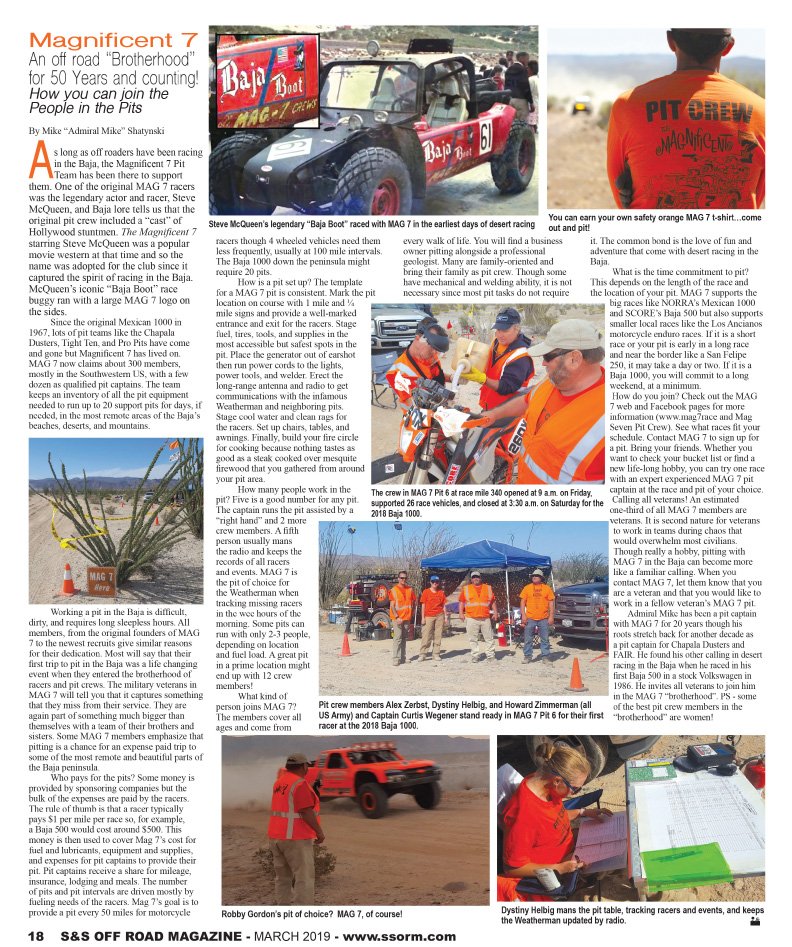MARCH 2019 | S & S OFF-ROAD MAGAZINE
HOW YOU CAN JOIN THE PEOPLE IN PITS: MAGNIFICENT 7, A “BROTHERHOOD” FOR 50 YEARS AND COUNTING
Written by Admiral Mike Shatynski, MAG 7 Member and Pit Captain
As long as off roaders have been racing in the Baja, the Magnificent 7 Pit Team has been there to support them. One of the original MAG 7 racers was the legendary actor and racer Steve McQueen. Baja lore tells us the the original pit crew included a “cast” of Hollywood stuntmen. The Magnificent 7 starring Steve McQueen was a popular western at that time and so the name was adopted for the club since it captured the spirit of racing in the Baja. McQueen’s iconic “Baja Boot” race buggy ran with a large MAG 7 logo on the sides.
Since the original Mexican 1000 in 1967, lots of pit teams like the Chapala Dusters, Tight Ten, and Pro Pit have come and gone, but MAG 7 has lived on. MAG 7 now claims about 300 members, mostly in the Southwestern US, with a few dozen as qualified pit captains. The team keeps an inventory of all the pit equipment needed to run up to 20 support pits for days, if needed, in the most remote areas of the Baja’s beaches, deserts, and mountains.
Working a pit in the Baja is difficult, dirty, and requires long sleepless hours. All members — from the founders of MAG 7 to the newest recruits — give similar reasons for their dedication. Most will say that their first trip to pit in the Baja was a life-changing event when they entered the brotherhood of racers and pit crews. The military veterans in MAG 7 will tell you that it captures something that they miss from their service. They are again part of something much bigger than themselves with a team of their brothers and sisters. Some MAG 7 members emphasize that pitting is a chance for n expense-paid trip to some of the most remove and beautiful parts of the Baja peninsula.
Who pays for the pits? Some money is provided by sponsoring companies but the bulk of the expenses are paid by the racers. The rule of thumb is that a racer typically pays $1 per mile per race so, for example, a Baja 500 would cost around $500.* This money is then used to cover MAG 7’s cost for fuel and lubricants, equipment and supplies, and expenses for pit captains to provide their pit. Pit captains receive a share for mileage, insurance, lodging and meals. The number of pits and pit intervals are driven mostly by fueling needs of the racers. MAG 7’s goal is to provide a pit every 50 miles for motorcycle racers, though 4-wheeled vehicles need them less frequently, usually at 100-mile intervals. The Baja 1000 down the peninsula might require 20 pits.
How is a pit set up? The template for MAG 7 is consistent. Mart the pit location on course with a 1-mile and 1/4 mile signs and provide a well-marked entrance and exit for the racers. Stage fuel, tires, tools, and supplies in the most accessible but safest spots in the pit. Place the generator out of earshot then run power cords to the lights, power tools, and welder. Erect the long-range antenna and radio to get communications with the infamous Weatherman and neighboring pits. Stage cool water and clean rags for the racers. Set up chairs, tables, and awnings. Finally, build your fire circle for cooking because nothing tastes as good as a steak cooked over mesquite firewood that you gathered from around your pit area.
How many people work in the pit? Five is a good number for any pit. The captain runs the pit assisted by a “right hand” and 2 more crew members. A fifth person usually mans the radio and keeps records of all racers and events. MAG 7 is the pit of choice for the Weatherman when tracking missing racers in the wee hours of the morning. Some pits can run with only 2-3 people, depending on location and fuel load. A great pit in a prime location might end up with 12 crew members!
What kind of person joins MAG 7? The members cover all ages and come from every walk of life. You will find a business owner pitting alongside a professional geologist. Many are family-oriented and bring their family as pit crew. Though some have mechanical and welding ability, it is not necessary since most its do not require it. The common bond is the love of fun and adventure that come with desert racing in the Baja.
What is the time commitment? This depends on the length of the race and the location of your pit. MAG 7 supports the bi races like NORRA’s Mexican 1000 and SCORE’s Baja 500, but also supports smaller local races like the Los Ancianos motorcycle enduro races. If it is a short race or your pit is early in a long race and near the border like a San Felipe 250, it may take a day or two. If it is a Baja 1000, you will commit to a long weekend at a minimum.
How do you join? Check out the MAG 7 website and Facebook page for more information. See what races fit your schedule. Contact MAG 7 to sign up for a pit. Bring your friends. Whether you want to check your bucket list or find a new life-long hobby, you can try one race with an expert experienced MAG 7 pit captain at the race and pit of your choice.
Calling all veterans! An estimated one-third of all MAG 7 members are veterans. It is second nature for veterans to work in teams during chaos that would overwhelm most civilians. Though really a hobby, pitting with MAG 7 in the Baja can become more like a familiar calling. When you contact MAG 7, let them know that you are a veteran and that you would like to work in a fellow veteran’s MAG 7 pit.
*The pricing referenced is this article is from 2019 and is not meant to be representative of current pricing.
Admiral Mike has been a pit captain with MAG 7 for over 20 years, though his roots stretch back for another decade as a pit captain for Chapala Dusters and FAIR. He found his other calling in desert racing in the Baja when he raced in his first Baja 500 in a stock Volkswagon in 1986. He invites all veterans to join him in the MAG 7 “brotherhood”. PS: Some of the best pit crew members in the “brotherhood” are women!


